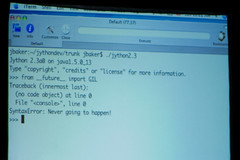It’s been 2 years since I’ve been to PyCon, and things have definitely changed. The last time I went to PyCon (2006 in Dallas), it was still a relatively small conference (3-400), if I remember what I was told), with a familiar feel, especially if you had attended in previous years, or were a part of the Python community. This year, there were over 1000 people (double the 500 people that came in 2007, apparently). I spent a sizable portion of the conference days feeling like “I miss a year, and you guys go and get 1000 people”. It’s a great thing that so many people are interested in Python.
The talks
I went to a reasonable number of talks – talk quality at PyCon has historically been pretty good, and I was a little out of date on the latest on things like Django and Turbogears. The best talk that I went to was Raymond Hettinger’s talk “Core Python Containers — Under the Hood”. This was a great talk for several reasons: Raymond was a good and entertaining speaker. There was significant technical meat – explanations of the implementation choices for all the core containers in Python, lists, sets, and dicts. We heard about doubling factors and amortized big-oh time. Most importantly, there was significant practical applications for Python programmers. Raymond’s talk gives a cost model for the core containers, and having an understanding of that model is important for folks who are writing Python programers. It’s also useful for developers of alternate Python implementations because it allows them to follow suit or to diverge and (hopefully) document the places where the cost model is different. My next favorite talk was Jim Baker’s “More Iterators in Action”. I missed the talk given last year, but I liked this one. Jim hit two of my favorite topics, language integrated query (LINQ) (albeit without the DSL), and concurrency.
Concurrency
There was a lot of interest in concurrency this year, which warms my heart, because I see high-level/dynamic languages and concurrency as the chocolate and peanut butter in the old Reese’s peanut butter cup commercials. There were 2 open space sessions and 1 lightning talk, and the topic entered many of the conversations that I had.
Sun, Jython, and JRuby
People were generally positive to learn about Sun’s interest in Python and Jython. A number of people stopped me to congratulate me on the new job, and we had a nice turnout at the open space session, where people were free with ideas, comments, and a few not so easy to answer questions. I hope that Sun can live up to the goodwill that people extended towards me and Frank.
If I was surprised about the jump in size of PyCon, I was even more surprised by the amount of energy around Jython. At most of the previous PyCon’s that I attended, people would mention Jython, and either be sorry that it was too out of date to consider, or be just plain dismissive of it. This year there was none of that. People were very interested in Jython. I was really surprised by how much interest there was, and by some of the people who were interested. It was certainly a nice feeling to sit in the sprint room and occasionally have people pop in to ask if such and such was running in Jython yet, or did Jython support X because package Y needed it.
This was the first time that I had met Frank Wierzbicki in person — I think he’s the happiest person at Sun right now. I was also able to spend some time hanging out with various folks from the Jython community. It seemed to me that the community was doing quite nicely. If you looked at some of the community metrics that we would use at the ASF to allow a project to graduate from incubation, almost all of those criteria have already been fulfilled. One of my goals for Sun’s Python efforts is for as many of them as possible to be highly community oriented, so it was nice to see that Jython is well on it’s way in that regard. The folks working on Jython are very sharp (including the aforementioned Jim Baker, who it turns out was a classmate of mine at the Brown CS dept – although neither of us can remember meeting the other), and have one of the those (in my mind) essential community ingredients, a community sense of humor.
Jim snuck this bit of commentary on Jython’s lack of a global interpreter lock into his talk.
There were several Ruby related surprises at PyCon this year. David Heinemeier Hansson, create of Ruby on Rails, made an appearance for one day, and a number of the JRuby committers made a road trip down from Minnesota, to hang out, meet the Jython folks, and generally display their hacker prowess. Which they totally did. Charlie and Tom powered their way to JRuby 1.1RC3 during the conference. Meanwhile Nick Sieger demonstrated what a happens when you stick a bunch of hackers, an EVDO card, and an EVDO hub into a car. The Jython guys (if any of them lived in the same state) need to get some of that – The best thing since the Adobe AIR Bus Tour, and at a fraction of the cost.. The JRuby folks and Jython folks are already starting to talk and share experiences, and I am sure that this will only result in even better dynamic language stuff for the JVM.
Other Cool stuff
On one of the sprint days, I did a bit of wandering and stopped to talk to my friend Brian Dorsey, who is doing some cool stuff here in Seattle. Brian was working with Richard Jones on pyglet and Bruce. Pyglet is a set of Python libraries for writing games and doing other kinds of multimedia. There’s pygame, which I am aware of because of Armin Rigo’s infamous use of pygame to deliver talks about PyPy. Richard has created Bruce, a presentation tool based on pyglet. In addition to being able to do cool multimedia presentation effects, there are some really cool things that you can do. Perhaps the coolest is that you can have a slide which is essentially an embeddd Python interpreter, so no more switching out of your presentation to demo your Python code at work. Really slick.
On a different note, on several evenings, conference goers who stuck around to hang out in the hotel’s common area were treated to musical performances by a dynamic (as in constantly changing set of members) band of Pythonistas:
The Sprints
Perhaps the most amazing way in which the conference has changed is this picture.
That is a picture of a part of the lunch crowd on the first day of the sprints following the conference. When I talked to David Goodger about it, he said that he had taken a count and there were over 250 people at the sprints. Visually, that sprint lunch room looked to be about the size of the room for the first PyCon that I attended (PyCon 2004). Simply amazing. The ASF has a hackathon before every ApacheCon, but I can’t remember one ever reaching this kind of size or scale. Another thing about the PyCon sprints is that they are aimed at growing the community — you don’t have to be a committer on any project in order to attend, and experienced project members will take time to sit and help new people get started. There were several people like that in the Jython sprint room. I was more impressed by what happened with the sprints than any other part of the conference. The only central organization here was that the conference planners obtained sprint space, and in a few cases got some sponsors to cough up money for lunch. Everything else was organized by the projects themselves (I heard that the Django folks closed 100 bugs in a single day). If you want to get a sense of what kinds of things got accomplished at the sprints, you can look at this page on the wiki — it’s not exhaustive, but it’s a start.
Travel
In the past, I’ve had some travel nightmares getting home from PyCon. This year I am happy to report that I didn’t have any problems at all, except for a fight that I had with the Sun internal travel system (and lost).
Conclusion
It was great to be back at PyCon. Interest in Python is growing (as measured by attendance), as is interest in Jython, and interested people are also rolling up their sleeves and pitching in (as measured by sprint attendance growth).





Pingback: Des nouvelles de python : pycon2008, python 3000, jython, LINQ, concurrency, django « Le blog de Patrick Vergain
Good reading about your PyCon 2008 experience as I look forward to attending my first PyCon in 2009. I would be presenting a tutorial session (A Tour of Python Standard Library) and I plan to take part in the Python sprint, which I am looking forward to eagerly. I hope, I meet you at PyCon.